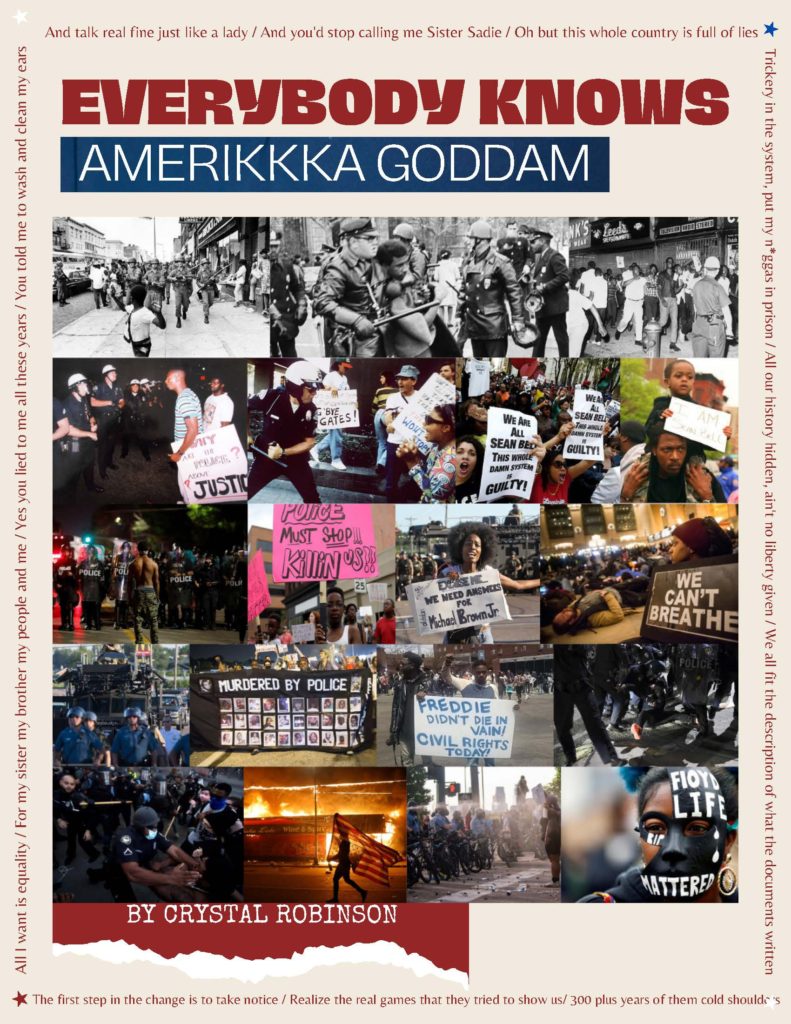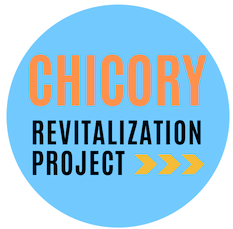
What Was Chicory?
Chicory magazine captured the words, passions, debates, and anger of black Baltimore from 1966-1983. A poetry magazine published by the Enoch Pratt Free Library, its 126 issues offer a window into a tumultuous time in Baltimore and the nation’s history. The Black Arts and Black Power Movements spurred communities to address inequities in the city through activism and art, including art as activism.
First edited by Sam Cornish, who became the poet laureate of Boston, Chicory took seriously the idea that the words of the people are poetry. It published, without editing, poems, stories, plays, and essays by people living in Baltimore’s poorest neighborhoods. It even published “street chatter,” or overheard anonymous conversations.
Chicory’s longest-serving editor was Melvin Brown, who partnered with organizations and institutions around Baltimore, like a school for pregnant teens and the local jail. Everett Adam Jackson was the final editor, continuing the magazine until funding ran out in 1983.
Chicory Revitalization Project
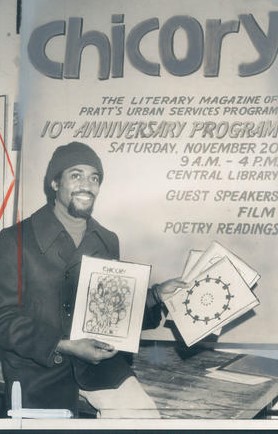
The Chicory Revitalization Project uses the power of poetry to promote civic dialogue about place. CRP extends Chicory’s model of using vernacular and written poetry as community expression and civic dialogue into present-day Baltimore.
In 2014, Mary Rizzo rediscovered Chicory while researching her book, Come and Be Shocked: Baltimore Beyond John Waters and The Wire. She partnered with Pratt library to digitize the entire magazine and make it freely available through the Digital Maryland State Repository. Thanks to a seed grant from the Whiting Foundation, she created the Chicory Revitalization Project with community stakeholders in Baltimore, including Pratt library, Writers in Baltimore Schools, Dewmore Baltimore, and UMBC. Three of Chicory’s editors, Sam Cornish (who passed away in 2018), Melvin Brown, and E. Adam Jackson, have been advisors on the project.
News & Events
Chicory Revitalization Project in the news!
- Chicory Revitalization Project founder Mary Rizzo has been awarded a Whiting Public Engagement fellowship to co-create a traveling exhibit on Chicory and the history of Black cultural activism in Baltimore. Read more here.
- Humanities for All profile of the Chicory Revitalization Project.
- “All Poetry to the People: Black Arts Movement Poetry as Public History,” History@Work, NCPH blog.
- “Decolonizing the Digital Literary Canon through Digitizing Chicory,” History@Work, NCPH blog.
- “Doin’ it for the Gram: How Baltimore’s Chicory Revitalization Project Uses Instagram to Engage the Public,” by Sydney Johnson, History@Work, NCPH Blog.
- “Project gives new life to Chicory, a forgotten Baltimore literary magazine,” Baltimore Sun, 10 March 2017.
- “Rutgers University scholars resurrect an old literary magazine for today’s generation,” Journal of Blacks in Higher Education, 19 April 2017.
Public Talks
Mary Rizzo, founder of the Chicory Revitalization Project, is available to discuss Chicory at your school, library or organization. She has spoken about Chicory at Penn State University, Abington; Rutgers University, New Brunswick; and, UMBC, Baltimore. Click the link below for a description of her talk. To arrange for her to speak, contact her at mrizzonj@gmail.com.
Upcoming Talk:
Black Arts Baltimore: A Counter History of the 1960s and 1970s
September, 6, 2022
7:00pm
Online or in-person at Enoch Pratt Free Library, Baltimore
In histories of Baltimore, the arts rarely occupy center stage. But during the 1960s and 1970s, Black artist-activists in Baltimore used culture to push for liberation. In this talk, Mary Rizzo will discuss her current research on this little-examined aspect of Baltimore Black history and how it changes our dominant narratives of Charm City.
Sample talk: “’The Most Authentic Microphone of Black Folks Talking Ever Devised’”: Baltimore’s Chicory Magazine and Making a Poetry Public Sphere, UMBC, Baltimore, MD, 5 March 2019.
Events
The Chicory Revitalization Project partners with community organizations to bring social justice poetry rooted in black history to young people today. Contact us at mrizzonj@gmail.com to learn more.
- Celebrated Dewmore Baltimore’s One-Year Anniversary with a free Chicory poetry workshop and open mic. November 8, 2019, 6-9pm, Impact Hub, 10 East North Ave., Baltimore.
- Writers in Baltimore Schools Senior Reading and Year-End Showcase featuring Chicory. June 14, 2019, Red Emma’s, Baltimore.
Chicory Today
Educators, poets, public historians and librarians are using Chicory today to spur discussions about racial identity, social justice, civil rights, and urban issues. The online archive of issues offers a plethora of material that can be used by anyone. If you do use Chicory, we’d love to know. Contact Mary Rizzo at mrizzonj@gmail.com.
Educator Resources
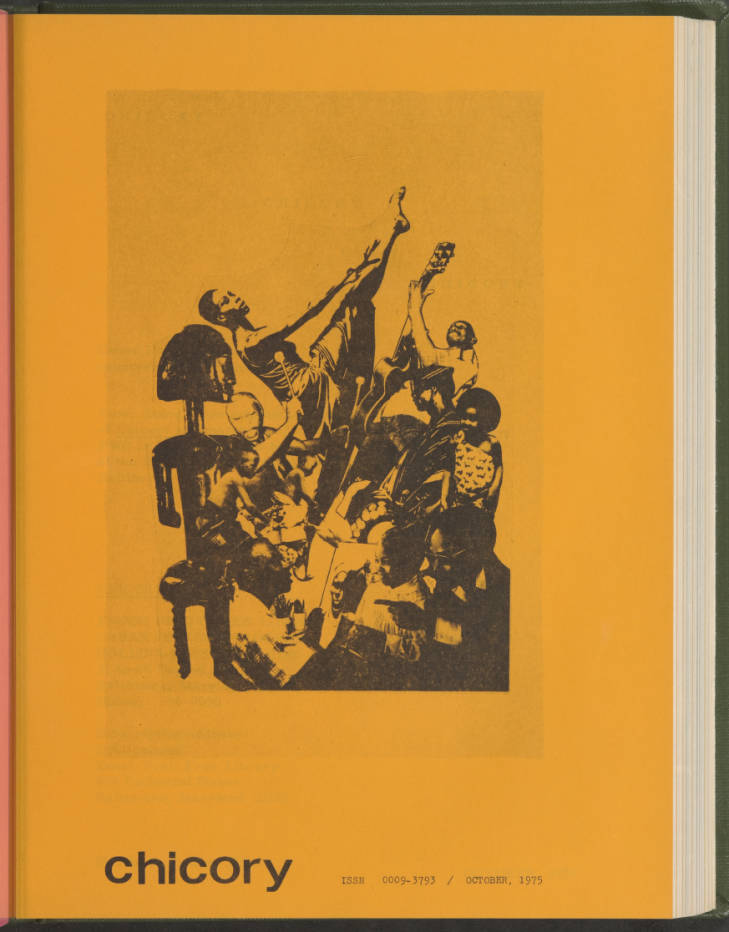
Looking to get your students interested in poetry or African American history? Because Chicory published the work of regular people, many of them teens, its language is vibrant and relatable.
Use Chicory in Your Classroom
- Every issue of Chicory is available at bit.ly/chicorymag for you to download and use!
- Subscribe to our Youtube channel for updates.
- Join our community on Instagram to get and share ideas.
Getting started using Chicory in your high school or college English, creative writing, social studies, African American or history classroom.
- Past and Present Zine: Have students choose a contemporary topic with historic roots that’s meaningful for them and create a zine where they express a point of view on it. Use Chicory as a model or have students choose poems and images from Chicory in their zine.
- Chicory Poetry Response Workshop: Click here to download a lesson to hold a workshop where students respond to Chicory poems about celebrations, place, and identity in groups. Watch what students in Baltimore produced from this workshop.
- Be Here Stories: Download this lesson to get your students to make connections between poetry and place. Through these activities, students will choose a poem from Chicory, assign it a location, write a response to it, and upload it to the Be Here Stories project. Listen below to hear Rutgers University-Newark students’ audio essays in response to Chicory poems.
Analyzing Chicory
Are you a scholar or researcher working with Chicory? Please let us know. For access to the Chicory corpus, contact Mary Rizzo at mary.rizzo@rutgers.edu.
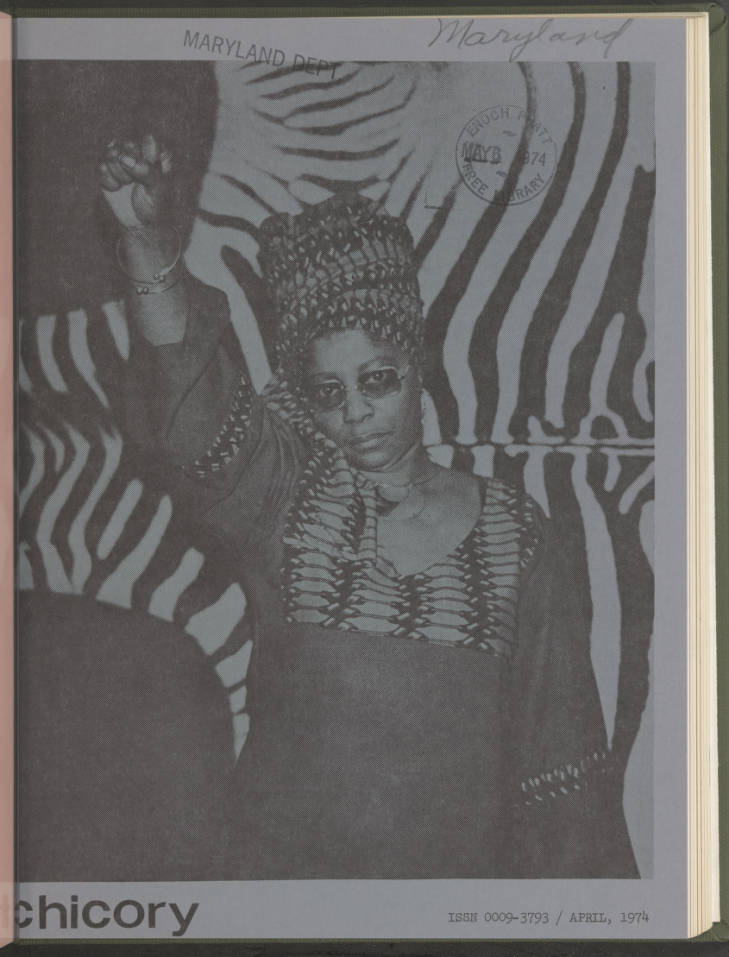
Chicory As Public History
- Chicory Revitalization Project founder Mary Rizzo has been awarded a Whiting Public Engagement fellowship to co-create a traveling exhibit on Chicory and the history of Black cultural activism in Baltimore. Read more here.
- “All Poetry to the People: Black Arts Movement Poetry as Public History,” History@Work, NCPH blog.
- “Decolonizing the Digital Literary Canon through Digitizing Chicory,” History@Work, NCPH blog.
- “Doin’ it for the Gram: How Baltimore’s Chicory Revitalization Project Uses Instagram to Engage the Public,” by Sydney Johnson, History@Work, NCPH Blog.
